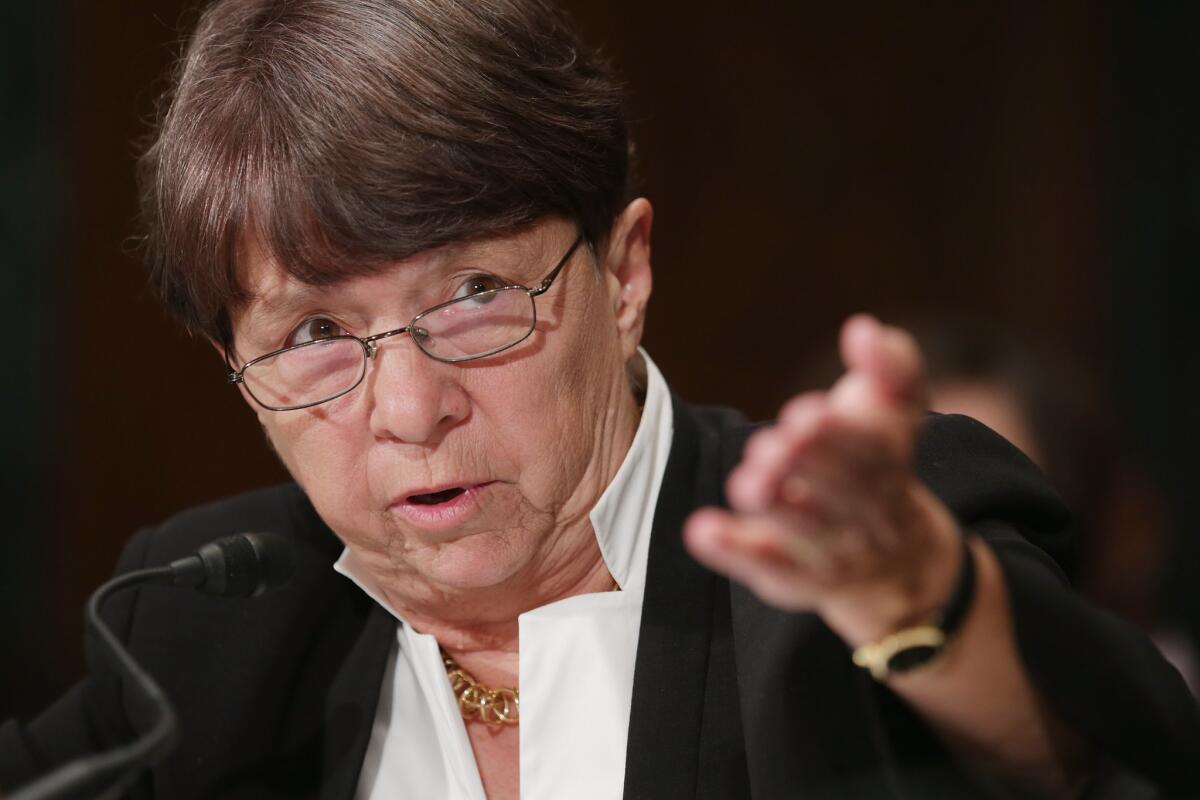Shareholders in the dark about ‘dark money’

- Share via
Anticipating the Securities and Exchange Commission’s actions can feel like waiting for Godot. The SEC has been sitting on a petition for a new rule requiring publicly traded companies to disclose to shareholders what corporate funds are spent on political activities. The petition was filed in August 2011 by 10 corporate law professors, yet the formal rule-making process on it still has not begun.
More than 640,000 people — including senators, representatives, state treasurers, comptrollers, former Vanguard Chief Executive John Bogle, investors and me — have filed public comments endorsing the need for such a rule. On Oct. 30, Sens. Elizabeth Warren (D-Mass.) and Robert Menendez (D-N.J.), among others, will hold a briefing in Washington to explain the benefits of such a rule.
Why is this rule needed? In 2010, the ground shifted dramatically in terms of what was legal for corporations and labor unions to do in partisan political fights. Before the Supreme Court ruling in Citizens United — the case that changed all of this — it was illegal for a corporation, large or small, to spend money on federal political ads. After Citizens United, although giving directly to a federal candidate is still banned, spending an unlimited amount of corporate resources on political ad buys in support of or in opposition to a candidate has become legal in every state.
The trouble is that disclosure laws haven’t caught up with the corporate right to spend, and there are gaps that allow corporations and other big spenders to mask their identities when they spend in politics. In particular, there is no rule at the SEC that requires public companies to tell their shareholders what they are up to in partisan elections. Corporations that spend in politics are using what Supreme Court Justice Louis Brandeis once referred to as “other people’s money.” Those other people are investors, and they deserve to know the truth.
However, some members of Congress have opted to take an anti-disclosure stance. They have fought legislation requiring disclosure and taken a bullying tone with new SEC Chairwoman Mary Jo White, including sending a letter urging her not to act on the petition. And the “dark money” lobby has denounced the petition and the need for transparency.
But the need for the new disclosure rule is self-evident. The information about how corporate political contributions are spent is material to investors in part because it can generate strong reactions from consumers and affect their investment. For example, Target in 2010 revealed that it spent $150,000 to support a Republican candidate in the Minnesota gubernatorial race who opposed same-sex marriage. The amount of money might not have been material, but the fact that it went to boost a partisan politician was. Target found itself the focus of multiple boycotts. This mattered to the public’s perception of the Target brand, and its stock took a tumble.
The SEC has a long tradition of going toe to toe with powerful interests in the area of money in politics. In the 1970s, the commission got to the bottom of how corporate money was funneled illegally into President Nixon’s reelection campaign. The SEC then worked with Congress to pass the Foreign Corrupt Practices Act, which requires companies to keep accurate books and records as a way to fight bribery of foreign officials. The SEC has been a leader in fighting “pay to play” practices in the municipal bond market and among investment advisors to public pension funds. It hasn’t shirked its responsibility to protect the markets.
If the law of the land allows corporations to spend unlimited money on politics, investors deserve to know when, why and how much. Enabling such transparency is within the SEC’s authority in its classic role as the guardian of our securities markets.
Given the resistance of some legislators and business interests, adopting this new rule will not be a cakewalk. But it is worth doing to protect the honest businessperson who is hurt when contracts are awarded not because of talent and moxie but because of rank political corruption.
Ciara Torres-Spelliscy is a Brennan Center fellow and an assistant professor of law at Stetson University College of Law, where she teaches election law and corporate governance. She is the author of “The SEC and Dark Political Money: An Historical Argument for Requiring Disclosure.”
More to Read
A cure for the common opinion
Get thought-provoking perspectives with our weekly newsletter.
You may occasionally receive promotional content from the Los Angeles Times.






